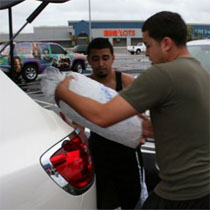A Houston business owner contributed a piece to Forbes.com, titled “Hurricane Ike’s IT Lessons”. Click here to read the linked article. The lessons are consistent with what we had written in the first edition of our book in 2002, just after our experience of 9-11, and in the second edition, Prepare for the Worst, Plan for the Best: Disaster Preparedness and Recovery for Small Businesses (Wiley, 2008): build in redundancy, disaster recovery is stressful, simple solutions are best, etc. I would hope that every small business owner would learn these lessons the easier, rather than the hard way, so please read another person’s view to take the message to heart!
Archive for the ‘Hurricane Ike’ Category
Hurricane Ike’s IT Lessons
Friday, October 3rd, 2008Get Some Breathing Room
Thursday, October 2nd, 2008With all of the reports in the news about the difficulties small businesses face in accessing credit, the bigger story is overlooked. Many small businesses contract with the federal government for net payment terms of 30 days on submission of an approved invoice. The federal government is stretching its payments out to 140 – 150 days, in effect, extracting interest-free financing from small business suppliers. Even worse, if the small business is the prime contractor, it must pay its sub-contractors even before it receives payment from the federal government. The Fortune-500 are also stretching out payments, although not to that extreme. Being an unwilling creditor is a more serious problem than being unable to access credit.
And with that happy thought, I would like to suggest that residents in the Houston-Galveston area in the wake of Ike begin to negotiate longer payment terms, reductions in interest rates or any other forbearance that they can with their creditors. In disaster recovery mode, everything takes longer than you think it will. Try to negotiate some breathing room for yourself while the powerful images of the disaster give you some negotiating leverage or sympathy. It is better to negotiate early in the process then when your accounts go into arrears and blemishes start to appear on your credit report. And it will reduce your stress level.
Residents Affected by Hurricanes Gustav and Ike to Benefit from FEMA Housing Assistance
Wednesday, October 1st, 2008The Department of Housing and Urban Development has joined with the Federal Emergency Management Agency to announce a housing assistance program for residents affected by Hurricanes Gustav and Ike. For more information about this program, click here to see the FEMA press release. The program appears to have much in common with FEMA’s Mortgage and Rental Assistance Program that was in effect during the 9/11 disaster, although it differs in some key respects to the assistance offered in the aftermath of Hurricane Katrina. Here are two tips from the experience of 9/11:
1. As I recommended in Prepare for the Worst, Plan for the Best: Disaster Preparedness and Recovery for Small Businesses (Wiley, second edition, 2008), always use a Certificate of Mailing for any correspondence with your insurance company or any relief agency. This is different from sending a letter via registered or certified mail in which the recipient must sign to acknowledge receipt of the letter or package. With a Certificate of Mailing, the recipient’s signature is unnecessary; it is the post office that provides certification of the date and time of the mailing. Why is this distinction important? Consider what happened in the aftermath of 9/11 to Lower Manhattan residents who were directed to mail their applications for the FEMA Mortgage and Rental Assistance Program to a designated post office box address for processing. Applications were not accepted through other channels. Weeks and months passed and residents wondered what had happened with their applications. As it turns out, FEMA had not paid the rent on its post office box. If the post office would have returned the undeliverable applications to the senders, the problem could have been detected earlier. But one error compounded another and the post office staff simply piled up the undeliverable applications in a back room. The Certificate of Mailing would have proved that the applicants met their deadlines irrespective of the problems on the recipient’s end, that is one of the reasons that I recommend its use. By the way, the book incorrectly states that the cost of the Certificate of Mailing is $0.60. It was $0.60 at the time I submitted the manuscript for the book, but it has since risen to $1.10, which is still a good value.
2. The information that FEMA and HUD have released indicates that benefits will be paid three months at a time. If they will process the benefits for this program as they did for the Mortgage and Rental Assistance Program, they will electronically deposit the funds in the recipient’s bank account. Given the economic difficulties and credit pressure, it is very likely that there are applicants in the Gulf Coast who may have judgments against them. In such a case, it would be better to set up a separate account for receipt of the electronic funds from which the rent or mortgage expense could be paid. An attorney with the 9/11 Project of the New York Legal Aid Society had informed me of an instance in which one of her clients had commingled his FEMA housing assistance money with other funds in his account and the FEMA money was garnished by a creditor. If you may be facing this risk, it is better not to take a chance. Use a separate account.
Confirmation on FEMA Hotels for Those Displaced by Ike
Wednesday, September 17th, 2008In my blog entry on Sunday, I reported that I had spent some time as a guest on a live broadcast of KTRH News Radio in Houston dealing with some of the urgent needs raised by their listening audience in response to Hurricane Ike. Chief among these was the need for a list of the FEMA hotels for the transitional housing program. Listeners in the Houston audience called in to this radio program, one after the other, to report that they could not obtain information from FEMA about which hotels were participating in the program so that they could attend to their urgent needs for shelter. The anchor of the news program reported that FEMA had not updated its website for Texas since Hurricane Dolly. I found the list of FEMA hotels in Texas for the Gustav evacuees and was assured that this list was the same for those displaced by Ike. I posted the link to this list on my blog on Sunday, September 14 and made it available to the news director of KTRH so he could convey the information to his listeners who did not have Internet connections.
Three days later, today at 6:30 p.m. Wednesday, September 17, the Associated Press reported that FEMA had finally published the list of participating hotels for the transitional shelter program. It is, indeed the same list I had posted on this blog on Sunday and made available to the listeners of KTRH when I was a guest on their program.
Housing Needs for Those Displaced by Ike
Sunday, September 14th, 2008This photograph shows the volunteer efforts of Houston Radio Station KTRH 740 AM News Radio to distribute ice and water to those in need before FEMA’s efforts have begun. I was a guest on their news radio program this afternoon to offer tips to their listeners about their urgent recovery needs. One of the issues that many callers had concerned the needs for immediate housing. FEMA has announced a program for offering hotel rooms but, according to the host of the radio program, FEMA’s website has not been updated for Texas since Hurricane Dolly. The callers reported frustration that they could not get information about this hotel program and which hotels are participating.
Here is how it works: Texas residents who have been displaced from their homes by Hurricane Ike can report to a participating hotel that is open and benefit from free temporary housing. These hotels have arrangements with FEMA to house displaced residents without requiring payment on check-in. It is similar to what the airlines do for you when you are bumped from a flight and they put you up overnight in a hotel. They have pre-negotiated rates with local hotels and you claim the room with a voucher. It is the same for the FEMA program, except that you don’t need a paper voucher.
The callers to the radio program expressed a great deal of confusion because they don’t know which hotels are participating and they cannot get through to FEMA. This is common in the aftermath of a major disaster: communications with relief agencies will be difficult. Here is the hotel list for Hurricane Gustav, but I am told that it applies for Ike as well. Be sure to call and confirm that the hotel is open for business and accepting guests before heading to any property. (By the way, for future reference, if you find yourself in a disaster and you don’t have Internet access, try calling the airlines. The FEMA hotel list in most cities substantially overlaps with the hotels that airlines have negotiated rates for passengers who have been bumped.)
Of course, once you secure temporary emergency housing for the next few nights, you will then have to deal with your longer-term housing needs. I will talk about that on tomorrow’s radio program. I will be a guest again on KTRH News Radio 740 AM in Houston at 7:00 a.m. CST and will also post some additional information on this blog.

